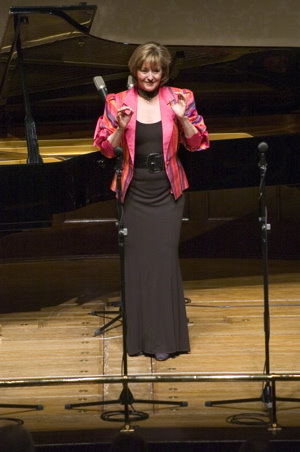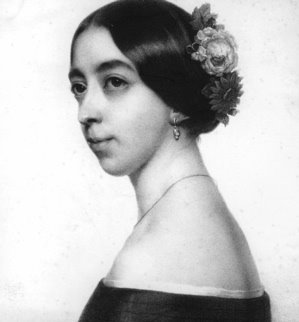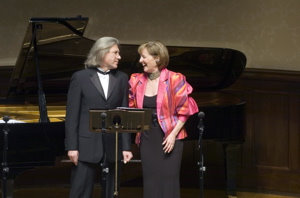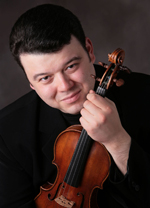
In the spring of 2008, Bay Area resident Frederica von Stade and I had an extended phone conversation. The ostensible purpose was her forthcoming participation in the U. S. premiere of a unique salon, Pauline Viardot and Friends.
The program, which had also been presented in London and Paris, took place in San Francisco’s Herbst Theater on March 20, 2008, under the auspices of San Francisco Performances. Singing works sung or composed by fabled 19th century mezzo-soprano Viardot, von Stade was joined onstage by mezzo Marilyn Horne (who served as narrator), soprano Melody Moore, and baritone Vladimir Chernov. My review of the performance appeared on the website of San Francisco Classical Voice.
Von Stade’s career began with her 1970 Metropolitan Opera debut at the age of 25. After creating a sensation as Cherubino in Santa Fe Opera’s July 1971 production of Le Nozze di Figaro, her success was assured. Her range has been vast, encompassing everything from operas by Mozart, Rossini, Offenbach, Bellini, and Strauss; contemporary works written for her by Jake Heggie and Dominick Argento; Cantelouble’s Songs of the Auvergne and other art songs; and complete recordings of The Sound of Music and Showboat. In December, she assumes the lead in Jake Heggie’s chamber opera, Three Decembers for San Francisco Opera.
She has recently announced that she will retire from the stage in 2010.
I reached Flicka (as everyone calls her) in Houston, in the midst of performances of the early version of Heggie’s chamber opera.
————————————————————
Frederica von Stade: We have the day off here in Houston. I’m taking our dog to the beauty parlor, where she’s getting a bath and getting all fixed up. While she’s doing that, I’m going to the Museum here, which is so beautiful.
Jason Victor Serinus: Let’s talk about the real important stuff. What kind of dog is she?
FVS: She is a West Highland Terrier. Her name is Hannah. You know, when your kids grow up and go away, you pour all your love into your dog. That’s what we do. She’s 3 1â„2. She was a 60th birthday gift from my girls. We just love her. I’ve had so much fun with her here. Patrick Summers, our wonderful conductor, goes to this particular doggie daycare. So that’s where my little brat is going.
JVS: How many pounds?
FVS: She’s almost 20. She should be 15, but she’s about 18 actually.
JVS: I remember way, way back, when Lotte Lehmann died, there was a very tacky obituary in the NY Times that trashed the fact that she carried her dog with her everywhere, displayed photos of her family in the dressing room, and spoke about her audience as ‘my public.’ As for me, I’m totally with you on your doggie. We buried our doggie, Baci Brown, in the backyard a few months ago.
FVS: Oh dear. That’s so hard. I figure Hannah and I will be 70 the same year. I can’t imagine not being with her. She’s such good company. She goes with us a lot of places at great expense, but she’s worth every penny.
JVS: Tell me how you got involved in the Pauline Viardot & Friends project, and how it started.

FVS: The Viardot project began thanks to this wonderful woman in LA, Judy Flannery. She talked to me about it three or four years ago. We did it in France first, about two years ago, and had a great time. It was in Paris and then in London. The music is so beautiful. Judy is an extremely dear and enthusiastic person. I’ve known her through some of the television stuff she’s done in the past. She fell in love with Viardot’s music; I know that many people have. Cecilia Bartoli just made a wonderful recording of the music, as did Isabel Bayrakdarian.
Our program narrator in San Francisco, Marilyn Horne (Jackie). has always known it. I think she even knew the family. She has a very special connection to Viardot’s music that’s going to be thrilling to find out more about. The evening is being presented very much as a salon. The narration includes a bit of information about Viardot, who was a fascinating lady, very much in the spirit of Alma Mahler.
Alma Mahler was a composer and married to a famous man. Viardot was a little bit of the same, but very driven by her musicianship. She was a great, great voice. Trained by famous baritone Manuel Garcia, her father, she’s the older sister of Maria Malibran. So that’s the connection to Marilyn. And I have a connection to Malibran too, because years ago I did a Malibran version of Sonnambula…
JVS: I was there! I heard it at San Francisco Opera!
FVS: Well, you know, the names Garcia and Malibran and all that mean a terrific amount to singers. When all this music started being done, a lot of people got on the bandwagon because the music is absolutely beautiful.
Viardot obviously knew how to write for the voice, and has written these beautiful songs in many languages. She wrote equally well in French, Russian, and Spanish. She also had a longtime love affair with Turgenev, even though she was married; that probably improved her Russian somewhat. She was a marvelous person, and I think it all comes through in her music.
JVS: How many places have you done the Viardot salon?
FVS: Only two: Wigmore Hall in London, and Le Chatelet in Paris.
JVS: So this is just the third time?
FVS: Yes. And we have this wonderful young soprano, Melody Moore, who’s joining us. What a wonderful voice. And she’s a terrific kid. So that’s kinda fun.
 Vladimir Chernov is one of the angels of the business. We all love him. And he does the Russian part, which is great.
Vladimir Chernov is one of the angels of the business. We all love him. And he does the Russian part, which is great.
Of course, the real thrust of the program is Viardot’s beautiful music, but of course it’s also Jackie [Marilyn Horne]. She brings so much to the stage that they don’t even need a script. Just let her talk, because she has so much to share. That’s certainly the thrill for me.
JVS: Is she being given free reign beyond the script?
FVS: Probably not. And she did tell me, God, there’s a lot of words to learn. So I don’t know.
JVS: So many people are happy that she’s still alive after her bout with pancreatic cancer.
FVS: She’s been a warrior, and so terrific.
JVS: What makes Vladimir one of the angels of the business?
FVS: He’s got this wonderful spirit, and this beautiful voice. He’s a very dear person, very gentle. I just adore him. I don’t know him all that well, but there’s something very special about him.
JVS: How much time will you have for rehearsal?
FVS: I get home from Houston on the 16th of March, and we’ll go right at it. Peter Grundberg is playing piano, and he adds something so special. It’s just amazing. I was lucky enough to do a fantastic concert with him. We were asked to do a program by this great young flute player, Matthieu DuFour, who’s first flute of the Chicago Symphony. They were doing this series, and he asked me to do a concert. It made me wonder if he knew how old I was. I didn’t know how the whole thing came about. Anyway, once I got into it, I called Peter and asked if there was a million dollar chance he was free to do the concert with me. He brought so much to it. We did these pieces for voice, flute and piano. Peter is an amazing person, an amazing pianist, and a great, great musician. He does a lot with the San Francisco Symphony and MTT. I’m really looking forward to working with him. He’s got a lot to say, and a lot of ideas. If he just brings 1/8 of his enthusiasm, it’ll be a dynamite evening. And, you know, former San Francisco Opera General Director Lofti Mansouri is directing. I adore Lofti. To get a chance to work with him again is really very special.
JVS: It sounds very much like a joy fest.
FVS: It is. I always try to sing at Marilyn’s birthday, but I didn’t think I’d get a chance to be on the stage with her performing together again. We go so far back.
JVS: What are you performing in Houston?
FVS: A fabulous piece by Jake Heggie that’s coming to San Francisco. Here it’s called Last Acts; in San Francisco they’re changing the name to Three Decembers, which is more in keeping with the piece.
It’s an absolute dream. Jake has pulled out a plumb. Really. It is so touching and so dear. It’s about an actress and her children, seen across three different decades.
First you see her writing a Christmas letter to her children, and she’s impossible. Then you see her 10 years later. In the last part, she’s actually dead, and it’s her memorial service, but she still comes back and sings [laughing]. It’s really an examination of relationships between a mother and her children. Their father is dead, and she’s made up this story about how he’s died. In the process of the opera, she tells them how he actually died.
I won’t tell you; you have to come see it, Jason. Jake has written melodies that are operatic and a little bit Broadway. It’s based on a beautiful play called Christmas Letters by Terence McNally. So it has Terence’s sweet touch. And librettist Gene Scheer the librettist has collaborated a lot with Jake. It’s wonderful! I get to play an actress who has six costume changes into beautiful costumes by Cesar Gallindo, a Mexican designer who is just starting to get really hot. So I’m having the time of my life.
JVS: You mentioned your age, which is six weeks older than my own. What is it like for someone who will be 63 on June 1 to go from performing in Jake’s piece in Houston right into rehearsals for the Viardot evenings in San Francisco?
FVS: I love it. I’m so grateful to have my hand in still, still learning about the voice and singing. I do have trouble with my memory, but that’s it. I can remember everything from 25 years ago, but things I knew perfectly two weeks ago will suddenly flash out of my mind. I get a little nervous about what I’m going to forget, and then of course I forget even more. You become your own worst enemy. But you know, to be able to do it, to be asked to do it, to have Jake invite me to do this and write it with me in mind, does it get any better than this? It doesn’t. It’s so lucky. I’m having a ball.
JVS: Do you have plans for more Viardot salons after San Francisco?
FVS: No, just this. If anything comes up, I’m available. They did talk about taking it on the road, and that may happen. But for right now, this is it.
JVS: I’ve heard Melody Moore, and know how well she sings. Given that it’s you, her, Marilyn Horne, and Vladimir Chernov, I would think that presenters all over the country would be clamoring for the program.
FVS: Well, you never know. I know they talked about doing it in LA, but I don’t know where that is at. It’s very hard to get the schedules of four people together. We’ll see. It would be fun to do it more if it works out.
JVS: Having heard the Malibran selections on Cecilia’s Maria album, which just blow me away…
FVS: She blows me a way all the time. She’s amazing. There’s such pure, pure joy of singing. I just love it. Everything about her.
JVS: That’s exactly why I think she was trashed so much by some critics early in her career. So many people could not deal with all that joy.
FVS: Yes.
JVS: They belittled it, and said she was only good at little character roles. They weren’t listening to the depth of her emotions, and the range of her repertoire.
FVS: Well, you know, the world is negative. That’s how it is, and there’s nothing you can do about it
JVS: How do you deal with negative criticism? You’re aware that you’re in your 60s. The voice has changed, and there are all these reactions.
FVS: Sometimes my feelings get hurt if the criticism is negative. I kind of put it aside. I figure it’s one of the drawbacks. I’ve always felt from the start of my career that if you split an audience up, you’d have 50 people who thought you were great, and 50 people who thought you were nothing.
So you sing for the ones who think you’re great. And I get to have this fun. It’s really not my job to worry about criticism. I can only control the tasks that I have at hand, which are to present a song, do what I’m told, follow the directions of the composer and director… I can’t worry about the rest of it. I can’t control it. You can never make people like you.
I don’t have one of those big, automatically beautiful voices and I’ve known that. So I’ve done what I can do, which is what I can do. I figure and feel very strongly that it’s an enormous privilege. I’ve been so lucky. I was lucky to get into the business, I’ve been lucky to stay in the business, I’ve been lucky to recover from some bad times in the business, and I’m still invited to do things here and there. I adore it.
The next six or eight months are full; I couldn’t make them any fuller. How lucky is that? And to be around young artists, and hear these gorgeous young voices, and to work with men like Jake Heggie and Patrick Summers and Leonard Folio here, and hear these great singers… I’m over the moon. I do have an eye to the future. My next project after this is to work with young kids, not as a singing teacher, but to try and create programs. I’ve helped start a little choir in Oakland, and I want to do more and more and more of that. I want to be able to tap some of my important colleagues to raise money so that we get some music into schools.
There’s this wonderful program, El Sistema, that they’re starting in LA thanks to Dudamel and José Antonio Abreu, who started this wonderful project of music in poor parts of Caracas. If I can contribute to that in any way… I love it. I’ve done this work for a couple of years in Oakland, and I see how it transforms young lives.
As Abreu said, the essence of music is harmony. If you can create harmony in people’s lives through music, you’ve given them something that they’re unlikely to know, especially today, when our educational system has gone downhill and downhill. You never think it can go down farther, but it seems to. If we don’t turn our energies in this country to education, we might as well just put a prison on every corner.
I’ve seen the good that’s happened from early education, especially with music, and teaching kids respect and love and everything good. I’ve seen it happen, because I’m part of the Sophia Project in Oakland, which helps at-risk families – parents, children, and families. It’s based on the Rudolf Steiner and Waldorf Method. Sophia Project has two houses in West Oakland, one on Myrtle (Myrtle House) for children aged birth to three years, the other on 19th Street (Sophia House) for children ages three to five. The Sophia Project is an offshoot of Raphael House in San Francisco. Carol Cole who started it ran the after-school program for Raphael House.
I’ve known some kids who started five years ago when they were five, and I’ve seen what’s happened to them. I’ve seen them enter into the system and do better because of their early experiences with the project. I’m really excited about it. Whenever I go home, I can plunge right in and work in my two little places, and tap my colleagues to give of their resources. There’s a lot more going on privately than people think.
I’m hopeful that the next Presidential administration will address it as well. We have to take care of people in this country. We have to. We have to take care of each other. We have to take care of people who can’t care for themselves. Health care is vital. Education is vital. Just caring for people is vital. Enough already of this scared, self-centered attitude.
We’re doing a big benefit for Sophia House on May 2. I’ve invited YMP, the Young Musician’s Program, a fabulous program for kids who could never afford private lessons, to perform. YMP is under the umbrella of Berkeley. The kids are performing and I’m performing with them in the first building at Fort Mason. There’s a pottery show, and there’s a little teeny stage. We bring in a piano and we do maybe two sets, 40 minutes each, while people stand around drinking wine and eating heavy hors d’oeuvres.
— Postscript: As a result of this conversation, Flicka and I joined forces at the Sophia Project benefit to perform Sull’aria, the letter duet from Le Nozze di Figaro. She sang the Countess, and I whistled Susanna. It was a joy.


